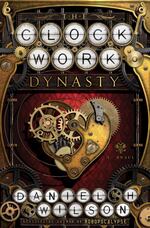
Novelist Daniel Wilson
courtesy of the author
Daniel H. Wilson is a New York Times best-selling novelist, robotics engineer and Cherokee citizen. He gave us forward-thinking science fiction page-turners like “Robopocalypse” and “How To Survive A Robot Uprising.” Now, he has a new novel that tears across the centuries, from prehistoric China to Tsarist Russia to Victorian England and — briefly — the present day Willamette Valley, chasing after exquisite sentient machines.
“The Clockwork Dynasty” is the story of a race of mechanical beings who’ve lived side-by-side with humans since the dawn of history. These are not the slick electronic robots of his other books. They’re beautiful, complex automatons — actually, Wilson uses a Russian name: avtomat — all full of gears, springs, brass and character.
The book will publish August 1st, and Wilson reads from it at Powell's August 4th.
These are a few highlights from the conversation with Wilson on this week’s "State of Wonder."

“The Clockwork Dynasty” will be published in August.
courtesy of the author
On stumbling into Russian history as a sci-fi novelist:
"Yeah, I kinda zagged when people expected me to zig.
"I was doing research for my novel 'Robogenesis' and I stumbled into this area of Russian history when Peter the Great — who was this really amazing, 6-foot-8, total autocratic ruler, but kind of a genius — he modernized Russia in a period of, like, 20 years. He just went to Europe, got a thousand scientists, and brought ‘em home. And this, to me, felt like an amazing historical occurrence. There’s a little bit of a Native American thing here where I kind of love the idea of whole cultures sort of modernizing themselves rapidly in order to survive. It’s kind of like humanity pushes itself."
On why he’s fictionalizing technological history:
"I started researching some of the triumphs that we had technologically in our distant past, things like the antikythera mechanism, which was discovered off the Greek islands and is considered the world's first analogue computer. But we actually didn't know what it was when we found it in 1900; we needed 80 years of actual technological development before we could even understand what it was. We had to literally invent computers before we could understand that these these people invented a computer thousands of years ago.
"So that just inspires me. I had this idea to write a novel where I acknowledge that our ancestors had their triumph and those triumphs are still walking among us."
On Elon Musk’s recent remarks to U.S. governors about the need to regulate artificial intelligence:
"The way that I interpret what he’s saying is that if we expect our artificial intelligences to behave ethically, we need, as a society, to figure out and formalize ethically what those rules are. And if we don’t, then it will be trial by error. And if it’s trial by error, then it will be dangerous. People will get hurt. Because AI is very powerful technology.
"And so, I think that he kind of is overwrought a little bit, but I’m glad that he’s bringing it up. Because it’s true: The technology’s really powerful, it’s going to move really fast, and we need to stop and think about, ethically, what we value as a society. The way we’ve done it up until now with all technology is pretty much, like, they just give it to us and then we work it out. But that’s not gonna fly when robots are embodied as 2,000-pound vehicles autonomously making decisions on our streets at 62 miles per hour."
On new technology and artificial intelligence in everyday life:
"People are really adaptable. And I think we’re not as easy to manipulate as they think. So I started playing virtual reality stuff and getting into that world. And when I first put that thing on, I was like, 'Oh my god.' Right? 'This is gonna change my life.' My body was having physiological reactions and stuff; I was getting viscerally scared when a zombie taller than me would loom over me.
"Then I played for two weeks.
"Your brain has a BS shield that, whenever you're confronted with something totally new, you have no resistance. But that BS shield builds up quickly. People adapt."